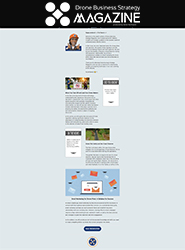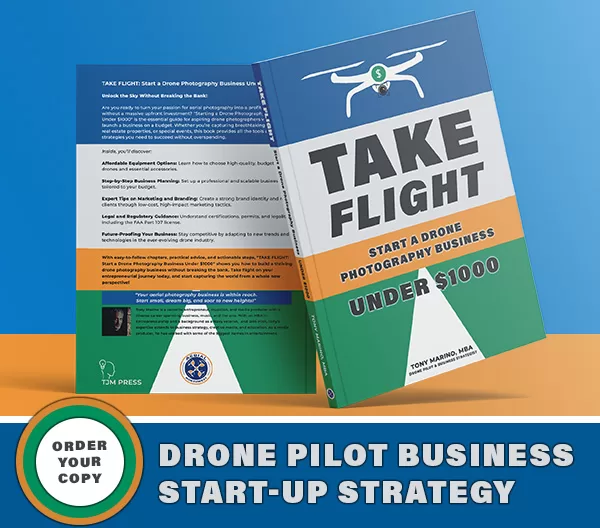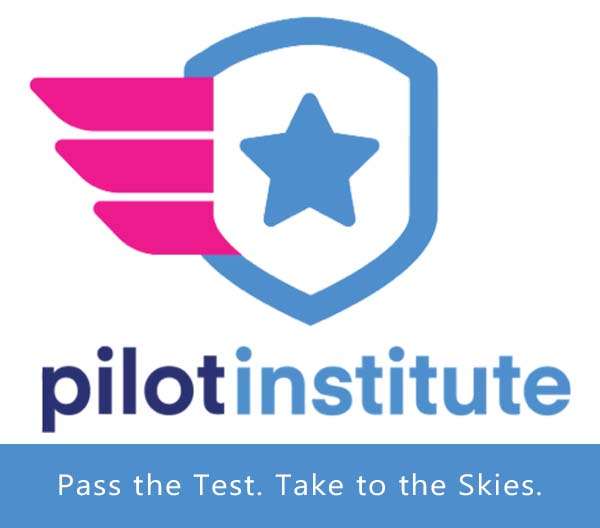
Starting a commercial drone business can be incredibly rewarding, but many new drone pilots make critical mistakes that can slow down their progress or even cause them to fail. Launching a commercial drone business isn’t just about flying a drone; it’s about building a solid foundation, understanding your market, and being strategic in your approach. Whether you’re just starting out or looking to scale, the biggest challenge new drone pilots face is not the technical skill of flying, but the business acumen to navigate the complexities of running a successful operation.
Below, we take a deep dive into these mistakes and provide actionable steps, along with real-world examples, to help you navigate the challenges smoothly and confidently.
1. Lack of Market Research → Know Your Market Before You Launch
Understand Your Market: Don’t just fly your drone and hope for the best—do the groundwork. Research potential clients, identify the niches that have the highest demand, and align your services with what customers need. Whether it’s real estate, construction, or agriculture, you’ll have a much higher chance of success if you understand the dynamics of the market you’re targeting.
Example:
John, a new drone pilot, launched a wedding videography business without researching demand in his area. After months of struggling to book clients, he realized that most couples were hiring traditional videographers instead of drone specialists. Had he researched beforehand, he could have focused on real estate photography, which was in much higher demand in his region.
The Mistake:
Many new drone pilots assume they can start a business just by having a drone and taking great photos. They fail to research who actually needs drone services, what competitors are offering, and whether their pricing is sustainable.
The Fix
- Identify your ideal customers: Are you targeting real estate agents, construction companies, event planners, farmers, or another industry
- Study your competition: Who else offers drone services in your area? What are their prices? What are their strengths and weaknesses?
ProTip:
Start by attending industry-specific events or online forums. Real estate agents and event planners often discuss the challenges they face and may provide insight into the services they are looking for.
2. Poor Financial Management → Plan Your Budget Like a Pro
Manage Your Finances: Running a profitable drone business requires more than just investing in the latest gear. It’s about balancing your budget for equipment, marketing, insurance, and other overheads. Pricing your services correctly will ensure you’re making a profit, and staying financially disciplined will help you weather the early stages when money may be tight.
Example:
Sarah spent $5,000 on a high-end drone and camera setup but forgot to budget for insurance, marketing, and software. Within a few months, she ran out of money and had to take a part-time job. If she had started with a budget-friendly drone and managed her expenses, she could have stayed financially stable.
The Mistake:
Many drone pilots underestimate how much it costs to run a business. They spend too much on gear, ignore hidden costs like insurance and marketing, and underprice their services, leading to financial struggles.
The Fix
- Set a budget: Account for equipment, insurance, software, fuel, website hosting, and marketing.
- Price your services correctly: Don’t just compete on price—factor in your time, skill, and expenses.
- Keep personal and business finances separate: Open a dedicated business bank account and track expenses.
ProTip:
Create a simple spreadsheet to track every expense. Having visibility into your finances will help you adjust your pricing and budget efficiently.
3. No Clear Business Model → Define How You’ll Make Money
Focus on a Business Model That Works: Specializing is key. Don’t try to do everything; choose a niche and craft packages that serve your ideal clients. A clear and focused business model helps you stand out from the competition and gives your marketing efforts a clear direction. It’s easier to build a brand when you’re known for excelling in one area, rather than being mediocre in several.
Example:
David started a drone business offering “everything”—from real estate to weddings to roof inspections. He struggled to attract customers because his messaging was unclear. Once he focused on real estate photography and created simple service packages, he started getting more bookings and repeat clients.
The Mistake:
Many new drone pilots start without a clear plan for making money. They offer too many services without focus or struggle to explain what makes them unique.
The Fix
- Choose a profitable niche: Real estate, construction, mapping, agriculture, events, or another specialized service.
- Offer service packages: Instead of just charging per flight, create tiered packages with clear pricing.
- Look for recurring revenue: Offer monthly retainer contracts for businesses that need regular drone work.
ProTip:
Narrow your niche down to a specific audience or industry, then craft specialized services for them. Focusing on one area will make it easier to market and build a reputation.
4. Trying to Do Everything Alone → Learn When to Get Help
Don’t Try to Do Everything Alone: When you’re starting out, it’s easy to think you need to manage every aspect of your business yourself, but this can quickly lead to burnout. Identify what tasks you excel at and outsource the rest—whether it’s editing, marketing, or client management. Leveraging freelancers or automation tools allows you to scale efficiently without overextending yourself.
Example:
Mike spent hours editing footage himself, delaying project delivery and missing out on new opportunities. Once he outsourced editing, he had more time to focus on flying and finding new clients, leading to increased revenue.
The Mistake:
New drone business owners often try to handle flying, editing, marketing, and client management alone. This can lead to burnout and slow growth.
The Fix
- Focus on what you do best: If you love flying but hate editing, outsource post-production.
- Use automation tools: CRM software like HoneyBook or Dubsado can handle client management.
- Network with other professionals: Partner with real estate agents, videographers, and marketers to create mutually beneficial relationships.
ProTip:
Use a task management tool like Trello or Asana to organize your workflow. This helps you visualize and prioritize tasks, making it easier to decide what to outsource.
5. Ignoring Marketing & Branding → Build a Strong Online Presence
Never Underestimate Marketing & Branding: You could be the best drone pilot out there, but if no one knows about your services, your business will stagnate. Building a strong online presence through a professional website, active social media profiles, and SEO strategies is essential. Building your brand takes time, but when you consistently provide valuable content, you’ll naturally attract your ideal clients.
Example:
Emily had excellent drone footage but didn’t have a website or active social media. Once she launched an Instagram page and started posting regularly, she gained visibility and booked her first five clients within a month.
The Mistake:
Many drone pilots assume that great work alone will attract clients. Without marketing and branding, they struggle to get steady business.
The Fix
- Build a website: Showcase your portfolio, services, and contact information.
- Use social media: Post drone footage regularly on Instagram, LinkedIn, and YouTube.
- Network in person: Attend business events, real estate meetups, and industry conferences.
- Invest in SEO and ads: Make sure potential clients can find you online when searching for drone services.
ProTip:
Invest in search engine optimization (SEO) for your website so it ranks higher in local searches. A well-optimized website can help potential clients find you quickly when they search for drone services in your area.
6. Hiring the Wrong People Too Soon → Scale at the Right Time
Grow at the Right Pace: It can be tempting to scale quickly by hiring staff or purchasing expensive equipment, but this can be a risky move if you haven’t secured steady revenue streams first. Focus on growing your client base, refining your offerings, and managing your cash flow before making major investments. Slow, steady growth ensures sustainability in the long term.
Example:
James hired an assistant and second drone pilot before securing regular clients. Within three months, he couldn’t afford to pay them and had to let them go. If he had waited until demand was steady, he could have grown sustainably.
The Mistake:
Some new business owners rush to hire team members before they have consistent revenue. This leads to unnecessary expenses and stress.
The Fix
- Start lean: Handle key tasks yourself until you have steady income.
- Use contractors/freelancers: Hire help only when necessary instead of bringing on full-time employees.
- Only expand when demand justifies it: If you consistently turn down work, then consider hiring.
ProTip:
Instead of hiring, consider offering a profit-sharing model with freelance contractors. This way, you can scale when the demand justifies it without taking on unnecessary financial risk.
7. Ignoring Legal & Compliance Issues → Protect Your Business from the Start
Get Your Legal and Compliance Ducks in a Row: Operating a commercial drone business requires more than just flying the drone. Be sure you’re licensed, insured, and compliant with local laws and regulations. Whether it’s securing drone insurance, understanding FAA Part 107, or creating contracts for your clients, it’s essential to have these legal and compliance elements squared away to protect both you and your business.
Example:
Chris flew a drone commercially without insurance. When his drone malfunctioned and damaged a car, he had to pay thousands out of pocket. A small investment in insurance could have saved him.
The Mistake:
Many new pilots operate without proper licenses, insurance, or contracts, leaving them exposed to fines and legal risks.
The Fix
- Get your FAA Part 107 license: Get your FAA Part 107 license (or equivalent in your country) before offering commercial services.
- Drone Insurance: Purchase drone insurance to protect yourself against liability.
- Contracts & Agreements: Use contracts for every client to define scope, payment terms, and deliverables.
ProTip:
Set up automatic reminders for insurance renewals and regulatory requirements, like license renewals, so you’re never caught off guard.
8. Poor Customer Focus → Deliver Outstanding Service
Client Relationships Matter: Building a loyal customer base takes time, but providing exceptional customer service will ensure repeat business and referrals. Always prioritize communication, manage expectations, and go the extra mile to deliver quality work. A satisfied client is often your best marketing tool, so treat them right and you’ll see the benefits.
Example:
Linda delivered great drone photos but never followed up with clients. When she started sending thank-you emails and asking for testimonials, she got more referrals and repeat business.
The Mistake:
Some drone pilots focus too much on flying and forget that business success depends on strong customer relationships.
The Fix
- Communicate clearly with clients: Explain expectations, timelines, and deliverables.
- Deliver high-quality work consistently: Attention to detail sets you apart.
- Follow up after projects: Ask for feedback and testimonials to build credibility.
ProTip:
Create a client feedback loop. After each project, ask clients for both positive feedback and areas for improvement. This shows professionalism and keeps clients coming back.
9. Scaling Too Fast → Grow Steadily, Not Chaotically
Slow and Steady vs. Fast and Furious: The road to success is rarely linear. There will be ups and downs, but the key is perseverance. Keep learning, stay flexible, and remain confident in your abilities as you grow your business. Remember, the most successful entrepreneurs are the ones who keep patiently going when others might quit.
Example:
Brian invested in three new drones before securing steady clients. After six months, two drones sat unused, wasting money. If he had grown slower, he could have invested more wisely.
The Mistake:
Many new drone businesses invest in expensive gear or expand too quickly before securing steady clients.
The Fix
- Start with essential equipment: Buy only what you need; upgrade later.
- Grow your client base first: Consistent income should come before expansion.
- Reinvest profits wisely: Focus on marketing, better software, and training.
ProTip:
Track your gear usage. If you notice certain drones or cameras are sitting unused, consider selling or renting them out to free up capital for more pressing needs.
10. Fear of Failure → Take Calculated Risks & Keep Learning
Learn from Your Failures: Starting any business comes with setbacks. Don’t be afraid of failure—instead, see it as an opportunity to learn. Whether it’s a failed marketing campaign or an unhappy client, take note of what went wrong, adjust your strategies, and keep moving forward. Continuous learning and adapting are essential in a fast-evolving industry like drone services.
Example:
Alex delayed launching his drone business for a year due to fear of competition. When he finally started, he realized there was plenty of work available—he had just wasted time doubting himself.
The Mistake:
Many aspiring drone pilots hesitate to take action due to fear of failure, competition, or rejection.
The Fix
- Start before you feel “ready”—you’ll learn more by doing.
- Embrace failure as feedback—every mistake is a lesson.
- Continuously educate yourself—stay updated on drone technology, regulations, and business strategies.
ProTip:
Set small, measurable goals to help reduce anxiety. Celebrate each small win to build confidence and momentum along the way.
Takeaway
In the drone industry, success isn’t just about having the latest tech or perfect flight skills—it’s about strategic thinking, solid business practices, and a commitment to continuous improvement. As you set out on your journey as a commercial drone pilot, take the time to understand the nuances of running a business and learn from the mistakes of others.
The beauty of the drone business is that it offers endless opportunities, but those opportunities are only realized when you approach them with the right mindset and a clear strategy. Stay disciplined, be patient, and most importantly, enjoy the ride.
Whether you’re capturing breathtaking aerial views or helping clients achieve their goals, your journey as a commercial drone pilot is just beginning—and the sky’s the limit!
If you have any questions, let us know! If you’d like to hire us, you can get more information here.
Written by: Tony Marino, MBA – FAA Certified Part 107 Commercial Drone Pilot and Chief Business Strategist at Aerial Northwest
Disclaimer: The information provided in this blog post is for general informational purposes only and should not be construed as legal advice.
Drone Pilot MBA (Podcast):
Avoid These 10 Costly Mistakes in Your Drone Business
Resources
Starting Your Own Drone Service Business
Pick up your copy today on Amazon and wherever fine books are sold.

DRONE BUSINESS STRATEGY MAGAZINE
A free digital publication made exclusively for all small business drone pilots to them help start-up, become profitable while sustaining a competitive advantage within the drone service industry sector they opt to serve.
“If you love to fly, we’d love to have you come aboard!”
We share your information with no one. Our Privacy Policy.










Leave a Reply
Your email is always safe with us.